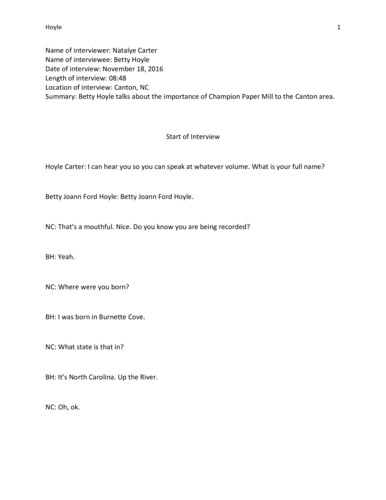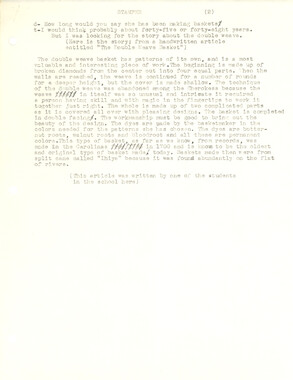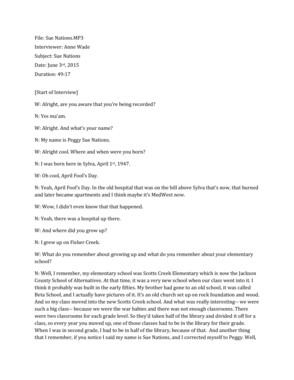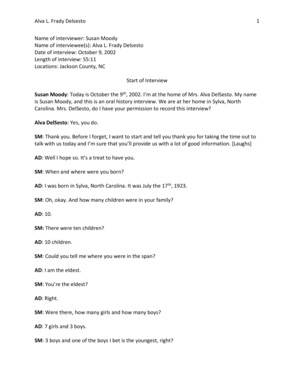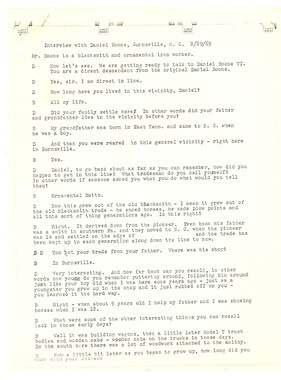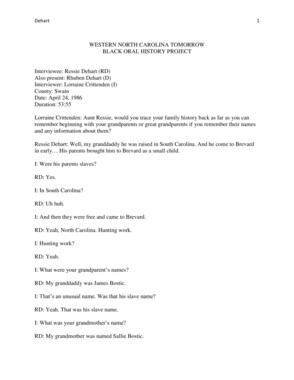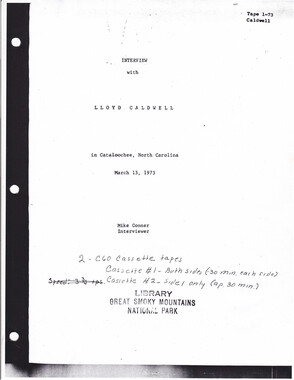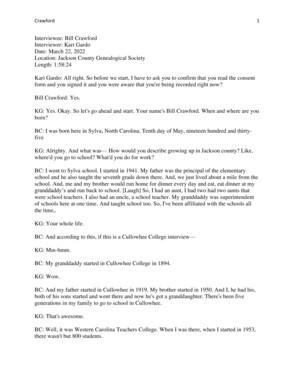Western Carolina University (21)
View all
- Canton Champion Fibre Company (2308)
- Cherokee Traditions (291)
- Civil War in Southern Appalachia (165)
- Craft Revival (1942)
- George Masa Collection (137)
- Great Smoky Mountains - A Park for America (3182)
- Highlights from Western Carolina University (422)
- Horace Kephart (998)
- Journeys Through Jackson (159)
- LGBTQIA+ Archive of Jackson County (90)
- Oral Histories of Western North Carolina (318)
- Picturing Appalachia (6617)
- Stories of Mountain Folk (413)
- Travel Western North Carolina (153)
- Western Carolina University Fine Art Museum Vitreograph Collection (129)
- Western Carolina University Herbarium (92)
- Western Carolina University: Making Memories (738)
- Western Carolina University Publications (2491)
- Western Carolina University Restricted Electronic Theses and Dissertations (146)
- Western North Carolina Regional Maps (71)
- World War II in Southern Appalachia (131)
University of North Carolina Asheville (6)
View all
- 1700s (1)
- 1830s (1)
- 1850s (1)
- 1860s (1)
- 1880s (1)
- 1890s (2)
- 1900s (2)
- 1920s (2)
- 1930s (5)
- 1940s (13)
- 1950s (20)
- 1960s (37)
- 1970s (32)
- 1980s (18)
- 1990s (11)
- 2000s (22)
- 2010s (25)
- 2020s (6)
- 1600s (0)
- 1800s (0)
- 1810s (0)
- 1820s (0)
- 1840s (0)
- 1870s (0)
- 1910s (0)
- Appalachian Region, Southern (19)
- Asheville (N.C.) (12)
- Avery County (N.C.) (1)
- Buncombe County (N.C.) (55)
- Cherokee County (N.C.) (17)
- Clay County (N.C.) (2)
- Graham County (N.C.) (15)
- Great Smoky Mountains National Park (N.C. and Tenn.) (1)
- Haywood County (N.C.) (42)
- Henderson County (N.C.) (5)
- Jackson County (N.C.) (134)
- Knox County (Tenn.) (1)
- Macon County (N.C.) (17)
- Madison County (N.C.) (4)
- McDowell County (N.C.) (1)
- Mitchell County (N.C.) (5)
- Polk County (N.C.) (3)
- Qualla Boundary (6)
- Rutherford County (N.C.) (1)
- Swain County (N.C.) (30)
- Watauga County (N.C.) (2)
- Waynesville (N.C.) (1)
- Yancey County (N.C.) (3)
- Blount County (Tenn.) (0)
- Knoxville (Tenn.) (0)
- Lake Santeetlah (N.C.) (0)
- Transylvania County (N.C.) (0)
- Digital Moving Image Formats (2)
- Interviews (318)
- Manuscripts (documents) (3)
- Personal Narratives (8)
- Photographs (4)
- Portraits (2)
- Sound Recordings (310)
- Transcripts (220)
- Aerial Photographs (0)
- Aerial Views (0)
- Albums (books) (0)
- Articles (0)
- Artifacts (object Genre) (0)
- Bibliographies (0)
- Biography (general Genre) (0)
- Cards (information Artifacts) (0)
- Clippings (information Artifacts) (0)
- Copybooks (instructional Materials) (0)
- Crafts (art Genres) (0)
- Depictions (visual Works) (0)
- Design Drawings (0)
- Drawings (visual Works) (0)
- Envelopes (0)
- Exhibitions (events) (0)
- Facsimiles (reproductions) (0)
- Fiction (general Genre) (0)
- Financial Records (0)
- Fliers (printed Matter) (0)
- Glass Plate Negatives (0)
- Guidebooks (0)
- Internegatives (0)
- Land Surveys (0)
- Letters (correspondence) (0)
- Maps (documents) (0)
- Memorandums (0)
- Minutes (administrative Records) (0)
- Negatives (photographs) (0)
- Newsletters (0)
- Newspapers (0)
- Notebooks (0)
- Occupation Currency (0)
- Paintings (visual Works) (0)
- Pen And Ink Drawings (0)
- Periodicals (0)
- Plans (maps) (0)
- Poetry (0)
- Postcards (0)
- Programs (documents) (0)
- Publications (documents) (0)
- Questionnaires (0)
- Relief Prints (0)
- Sayings (literary Genre) (0)
- Scrapbooks (0)
- Sheet Music (0)
- Slides (photographs) (0)
- Songs (musical Compositions) (0)
- Specimens (0)
- Speeches (documents) (0)
- Text Messages (0)
- Tintypes (photographs) (0)
- WCU Mountain Heritage Center Oral Histories (25)
- WCU Oral History Collection - Mountain People, Mountain Lives (71)
- Western North Carolina Tomorrow Black Oral History Project (69)
- A.L. Ensley Collection (0)
- Appalachian Industrial School Records (0)
- Appalachian National Park Association Records (0)
- Axley-Meroney Collection (0)
- Bayard Wootten Photograph Collection (0)
- Bethel Rural Community Organization Collection (0)
- Blumer Collection (0)
- C.W. Slagle Collection (0)
- Canton Area Historical Museum (0)
- Carlos C. Campbell Collection (0)
- Cataloochee History Project (0)
- Cherokee Studies Collection (0)
- Daisy Dame Photograph Album (0)
- Daniel Boone VI Collection (0)
- Doris Ulmann Photograph Collection (0)
- Elizabeth H. Lasley Collection (0)
- Elizabeth Woolworth Szold Fleharty Collection (0)
- Frank Fry Collection (0)
- George Masa Collection (0)
- Gideon Laney Collection (0)
- Hazel Scarborough Collection (0)
- Hiram C. Wilburn Papers (0)
- Historic Photographs Collection (0)
- Horace Kephart Collection (0)
- Humbard Collection (0)
- Hunter and Weaver Families Collection (0)
- I. D. Blumenthal Collection (0)
- Isadora Williams Collection (0)
- Jesse Bryson Stalcup Collection (0)
- Jim Thompson Collection (0)
- John B. Battle Collection (0)
- John C. Campbell Folk School Records (0)
- John Parris Collection (0)
- Judaculla Rock project (0)
- Kelly Bennett Collection (0)
- Love Family Papers (0)
- Major Wiley Parris Civil War Letters (0)
- Map Collection (0)
- McFee-Misemer Civil War Letters (0)
- Mountain Heritage Center Collection (0)
- Norburn - Robertson - Thomson Families Collection (0)
- Pauline Hood Collection (0)
- Pre-Guild Collection (0)
- Qualla Arts and Crafts Mutual Collection (0)
- R.A. Romanes Collection (0)
- Rosser H. Taylor Collection (0)
- Samuel Robert Owens Collection (0)
- Sara Madison Collection (0)
- Sherrill Studio Photo Collection (0)
- Smoky Mountains Hiking Club Collection (0)
- Stories of Mountain Folk - Radio Programs (0)
- The Reporter, Western Carolina University (0)
- Venoy and Elizabeth Reed Collection (0)
- WCU Gender and Sexuality Oral History Project (0)
- WCU Students Newspapers Collection (0)
- William Williams Stringfield Collection (0)
- Zebulon Weaver Collection (0)
- African Americans (97)
- Artisans (5)
- Cherokee pottery (1)
- Cherokee women (1)
- College student newspapers and periodicals (4)
- Education (3)
- Floods (15)
- Folk music (3)
- Great Smoky Mountains National Park (N.C. and Tenn.) (1)
- Hunting (1)
- Logging (5)
- Mines and mineral resources (2)
- Rural electrification -- North Carolina, Western (2)
- School integration -- Southern States (2)
- Segregation -- North Carolina, Western (5)
- Slavery (5)
- Sports (2)
- Storytelling (3)
- World War, 1939-1945 (3)
- Appalachian Trail (0)
- Cherokee art (0)
- Cherokee artists -- North Carolina (0)
- Cherokee language (0)
- Church buildings (0)
- Civilian Conservation Corps (U.S.) (0)
- Dams (0)
- Dance (0)
- Forced removal, 1813-1903 (0)
- Forest conservation (0)
- Forests and forestry (0)
- Gender nonconformity (0)
- Landscape photography (0)
- Maps (0)
- North Carolina -- Maps (0)
- Paper industry (0)
- Postcards (0)
- Pottery (0)
- Railroad trains (0)
- Waterfalls -- Great Smoky Mountains (N.C. and Tenn.) (0)
- Weaving -- Appalachian Region, Southern (0)
- Wood-carving -- Appalachian Region, Southern (0)
Interview with Betty Hoyle
Item
Item’s are ‘child’ level descriptions to ‘parent’ objects, (e.g. one page of a whole book).
-
-
Hoyle 1 Name of interviewer: Natalye Carter Name of interviewee: Betty Hoyle Date of interview: November 18, 2016 Length of interview: 08:48 Location of interview: Canton, NC Summary: Betty Hoyle talks about the importance of Champion Paper Mill to the Canton area. Start of Interview Hoyle Carter: I can hear you so you can speak at whatever volume. What is your full name? Betty Joann Ford Hoyle: Betty Joann Ford Hoyle. NC: That’s a mouthful. Nice. Do you know you are being recorded? BH: Yeah. NC: Where were you born? BH: I was born in Burnette Cove. NC: What state is that in? BH: It’s North Carolina. Up the River. NC: Oh, ok. Hoyle 2 BH: Up towards the Pisgah, you know the foothill of Pisgah. Up in there. You know you go up there towards Cruso then you go back up like you’re going up to Pisgah Mountain there’s a little cove up in there called Burnette Cove and that’s where I was born. NC: That’s cool. BH: At home. NC: At home? BH: At home. NC: Wow BH: We don’t have to go to the hospital. NC: Ok, if you don’t mind me asking how old are you? BH: 78. NC: So what year would that make you be born in? BH: 1938. NC: Oh wow, that’s awesome. Ok, where did you grow up? BH: I grew up in Stamey Cove. Hoyle 3 NC: Ok, when did you move to Canton? BH: When I was 16 years old. NC: Alright, when I say Champion Paper Mill what come to mind? BH: Food. NC: Food? BH: Food, yeah I mean you worked at The Champion you could buy groceries at the company store, you could buy shoes. Everybody had an account at the company store when I was small. Yeah, it’s survival, it was the only place around here you could work at first in the early 1900s. NC: That’s interesting. What did the Canton Mill mean to you? Was it a job or a livelihood? BH: Livelihood. NC: Was the mill a direct part of your life? BH: Well, it wasn’t a direct part of mine, but my dad worked there and two of my brothers worked there and retired there. NC: Interesting. How did the mill effect your way of life? Did it effect the environment or the community? BH: No, not to us. I mean you know, of course there was smoke and sometimes the cars would rust out and everything, but and it had an odor to it but it smelled like money to us. Hoyle 4 NC: That’s an interesting way of putting that. That’s really cool. Did the mill effect Cantons society in your opinion, culturally, socially, or economically? Why or why not? BH: Well like I said, my dad was born in 1906 my eldest brother was in ‘23. My dad was working at The Champion when he was born. So I would say it was economics because like I said they’re weren’t no other plant around here then. Until Enka come along and that’s down towards Chandler. And then after that it was like the rubber plant up there it come many years later. The Champion was where people worked when I was young. NC: Ok. How do you think people should remember the mill? BH: I think they should remember if it hadn’t been for The Champion a lot of people wouldn’t have made it up here. NC: Interesting. Should the mill be an important part of local or state history? BH: Yeah. NC: Both? BH: Both. NC: Alright, is there anything you would like to add? BH: No not really. NC: Ok. Hoyle 5 BH: It was just a way of life. Everyone worked at The Champion honey, Daddy’s, Brothers, Uncles, everybody. HC: Ok. NJFF: Yeah. NC: Interesting. So you said your dad worked there? BH: My dad worked there, and two of my brothers and they all retired from there. I had bunches of uncles and cousins and families worked there. NC: Well that’s all I have. BH: Huh? NC: That’s all I have. BH: Ok, I don’t know when The Champion started, it was probably early 1900s because like I said my dad was born 1906 my oldest brother in 1923 and he had been working a long time when Ralph was born. NC: That’s cool. BH: So it’s been around a long time. I can call Sarah she may know. NC: What? Hoyle 6 BH: She’s 80 years old she may know when Champion started. Because her daddy worked there too. NC: I know the history of the mill, I’m looking at the impacts, how people were affected by the mill. BH: Yeah well like I said honey, back then you know it was about the only place in this area to work and everybody worked there, everybody. Come here Conan, Conan the barbarian. NC: [Laughter] BH: You be good. Unknown: What breed is that? BH: What? Unknown: What kind of dog is he? BH: She wasn’t but this big? unkonwn: Because his face looks like a pug but his body doesn’t. BH: Yeah, yeah he’s got puggy face. NC: Ok, the last thing I need you to do is sign the inform consent form. BH: Print first? Hoyle 7 NC: Yes. BH: You want me to put my maiden name too? NC: You can out any name you would like. BH: I love history. NC: Thank you. BH: You’re more than welcome honey. NC: Alright, I really appreciate you letting me come out here and interview you. BH: That’s fine. Like I say sweety, that mills been here for a long time. NC: I can give you a copy of the transcript if you would like. BH: No. NC: Or my final paper if you would like that. Just to read over it and see what I said. BH: Give one to Becky, and she’ll give it to me. NC: Ok. Well thank you. Hoyle 8 BH: As long as it helps you with your grade and stuff like that honey I’m fine with it. Yeah but like I said. END OF INTERVIEW
Object
Object’s are ‘parent’ level descriptions to ‘children’ items, (e.g. a book with pages).
-
Betty Hoyle talks about the importance of the Champion Paper Mill to the people of the Canton area.
-
